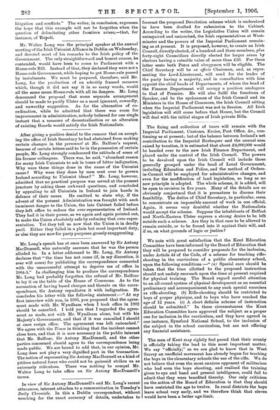Mr. Long's speech has at once been answered by Sir
Antony MacDonnell, who naturally assumes that he was the person alluded to. In a letter addressed to Mr. Long, Sir Antony declares that "the time has not come (if, in my discretion, it ever will come) for publishing the correspondence connected with the unsuccessful attempt to deprive me of office in 1904-5." In challenging him to produce the correspondence Mr. Long had probably forgotten the refusal of Mr. Balfour to lay it on the table of the House of Commons. As to the accusation of having based charges and threats on the corre- spondence, Sir Antony repudiates it with indignation. He concludes his letter with the following statement:—" At my first interview with you, in 1905, you proposed that the agree- ment made with Mr. Wyndham when I took office in 1902 should be cancelled. I told you that I regarded the agree- ment as made, not with Mr. Wyndham alone, but with his Majesty's Government, and that if it was cancelled I should at once resign office. The agreement was left .untouched." We agree with the Times in thinking that the incident cannot close here, and that it is now necessary in the public interest that Mr. Balfour, Sir Antony MacDonnell, and the other parties concerned should agree to the correspondence being made public. We are bound to add that, in our opinion, Mr. Long does not play a very dignified part in the transaction. The notion of representing Sir Antony MacDonnell as a kind of pitiless natural force who could not be gainsaid strikes us as extremely ridiculous. There was nothing be compel Mr. Walter Long to take office on Sir Antony MacDonnell's terms.


































 Previous page
Previous page